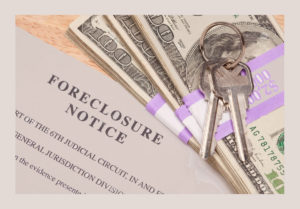| Federal legislation was enacted effective May 20, 2009, requiring property owners who have taken a residential property by foreclosure, to give their tenants at least a 90 day notice to vacate the property before beginning the eviction process. That federal law is applicable nation wide, and it is known as “Protecting Tenants At Foreclosure Act”. The law is found at Title 7 US Code Section 701 (“the Act”). See http://thomas.loc.gov. The Act provides that if a tenant is renting under a lease entered into before the notice of foreclosure was communicated to the tenant, the tenant may remain in the property until the lease ends, unless the owner sells the property to a purchaser who will occupy the property as his primary residence. In that case, the owner may properly give the tenant a 90-day notice to vacate. While the Act provides greater protection to tenants than State law, local law may provide even more protection. If a particular property is subject to local “rent control” or “housing assistance” laws, or so-called “just cause for eviction” ordinances, those laws may provide even greater protection than the Act itself. As an example, even the Act itself provides that the owner of a residential property which is subject to a “housing assistance contract”, and who has a lease with a tenant in that property, is subject to any additional protections in the housing assistance contract (this typically applies to “Section 8” properties). Finally, with the signing of SB 1149, tenants must be told of their rights when the property they occupy is foreclosed. Senate Bill 1149 requires that tenants who are living in foreclosed homes be given notice of their rights and responsibilities under these state and federal laws by requiring a cover sheet be attached to any eviction notice that is served within one year of a foreclosure sale. The cover sheet must delineate the laws and rights a tenant may have in cases where the property he or she occupies is foreclosed upon. The bill also seeks to help protect tenants who would otherwise have a negative mark on their rental history by prohibiting the release of court records in a foreclosure-related eviction unless the plaintiff landlord prevails. For more information, please visit www.leginfo.ca.gov.
| What Tenants and Resident Owners Can Do to Protect Themselves Tenants and resident owners of foreclosed properties must take a significant amount of personal responsibility in this matter. They should become acquainted with Federal and State law concerning foreclosures and tenant evictions, and also with local laws which apply to their particular situation. For example, in the City of Los Angeles, beginning December 17, 2008, tenants who are current in their rent payments can not be evicted because of a foreclosure. Many cities in California, including Santa Monica, West Hollywood, Beverly Hills, Oakland, and Berkeley, are subject to local “rent control” and/or “just cause for eviction” ordinances, which may provide even greater protections. Without a working knowledge of applicable local law, a tenant is at a distinct disadvantage. Tenants and resident owners should make sure that any “cash for keys” offer is coming from the new owner of the property, which is often a lender or a government sponsored mortgage investor, such as Fannie Mae or Freddie Mac. Tenants and resident owners should insist on verifying the identification and authority of the person making the “cash for keys” offer. They must insist on receiving a written “cash for keys” agreement, and carefully read and understand that agreement. They should have a trusted and competent attorney, real estate licensee, family member or friend review the agreement and provide counsel concerning its duties and obligations. Before signing the agreement, a resident owner should call his or her lender directly to confirm the authority of the person making the “cash for keys” offer. A tenant must be especially careful. The tenant should call his or her landlord and ask about the foreclosure and the identity and contact information for the new owner. It would not be unusual for the landlord to tell the tenant to continue to make rent payments directly to the landlord. That should not be done if the landlord is no longer the owner of the property. And finally, a tenant or resident owner should never hand the keys over unless the money is delivered. Cash is best. If paid by check, the tenant or resident owner should make certain the check is good and/or clears. If the keys are handed over, and the owner fails to pay the money, or if the owner’s check bounces, the written agreement should be sufficient to allow the tenant to prevail in a small claims action against the owner. But obtaining a judgment is far easier than collecting it. Without a written agreement, the chances of obtaining a judgment are substantially reduced. A Real Estate License is Required Unless the “Cash For Keys” Services are Only Ministerial There is no way to generalize and declare that a real estate license is, or is not, required to provide “cash for keys” services. The particular facts of each transaction will determine the answer to the question as to whether a license is required.
| If a person is soliciting a tenant to enter into a cash for keys arrangement on behalf of an owner and/or lender or servicer, negotiating the terms of the transaction with a tenant, or soliciting and/or negotiating with an owner, lender or servicer with respect to
| such a transaction(s), Section 10131 of the California Business and Professions Code requires that the person engaged in those activities be a real estate broker or a real estate salesperson acting under the supervision of a broker. On the other hand, if the person is simply acting in a ministerial fashion and just handing the tenant a check and collecting the keys in return for the payment, that arguably falls outside of licensed activity. Responsibility of Real Estate Licensees Who Engage in “Cash For Keys” Transactions |
A licensee who solicits a “cash for keys” deal should identify him or herself to the resident owner or tenant when requested to, and provide his or her DRE license number. A consumer may look on the DRE website (www.dre.ca.gov) and, on the “Home” tab, under the heading “Consumers”, click on “License Status Check” to verify that person’s license status. Under that same heading, there is also a link to “How to File a Complaint”. One who has been solicited by a DRE licensee is encouraged to file a complaint with DRE if the solicitor has not acted fairly and honestly in the “cash for keys” transaction, or if the solicitor has engaged in any other unlawful conduct. It should go without saying that California real estate brokers or salespersons who engage in “cash for keys” negotiations with tenants must be aware of the federal, State and local laws relating to foreclosed properties, and the tenants’ rights with respect to their tenancies or leasehold interests. The old saying “ignorance of the law is no excuse” really does apply in this context. It should also go without saying that DRE licensees who solicit a resident owner or tenant to accept a “cash for keys” proposal must act fairly and honestly with respect to the transaction. Dishonest behavior, misrepresentations, harassment, failures to disclose material information to a resident owner or tenant, including failing to advise the resident owner or tenant of his or her rights with respect to eviction (that the licensee has knowledge of) as a result of foreclosure, or negligence, could possibly lead to license disciplinary action. A licensee who unlawfully hires unlicensed persons to “solicit” cash for keys deals, or to negotiate the terms of the transactions, can also be liable for the dishonesty, misrepresentations, and/or negligence of his or her unlicensed agents. Conclusion A fair and equitable cash for keys agreement will mutually benefit both the new owner of the property and the resident former owner or tenant residing in the property. For tenants, resident owners, and Department of Real Estate licensees, knowledge of the law concerning this subject is power – power to avoid problems that are just looking for place to happen.
| For resident owners and tenants in foreclosed properties, your only real safety lies in your
| taking the responsibility to protect yourself. Get the agreement and all other communications in writing. Have someone you trust look the written documents over. Make sure the solicitor is authorized to act for the real owner of the property. And do not give up the keys before you get the cash. |
| www.ag.ca.gov, and/or the California Department of Real Estate at www.dre.ca.gov. (Rev. April 2012) Additional Resources: The Office of the California Attorney General issued a News Release on June 28, 2010, entitled “Brown Investigates Whether Tenants’ Rights Are Violated in Foreclosures”. You may wish to consult that Release for more information. If you are a tenant or resident owner and believe your rights have been violated, you can contact the California Attorney General at |
The Los Angeles City Council approved an amendment to the RSO to require notice to tenants prior to executing a “cash for keys” agreement. The Tenant Buyout Notification Program (LAMC 151.31) provides for regulation, monitoring and enforcement of voluntary vacancies of RSO rental units occurring pursuant to a Buyout Agreement. To promote fairness during buyout negotiations and agreements, landlords must inform tenants of their RSO rights which include the RSO relocation assistance amounts before executing a Buyout Agreement. Disclosure notices must be filed with the City. The required Disclosure Notice is provided at the end of this bulletin. This notice must be provided to tenants before executing a Buyout/Cash for Keys agreement to vacate an RSO rental unit.
|
|
|
|

